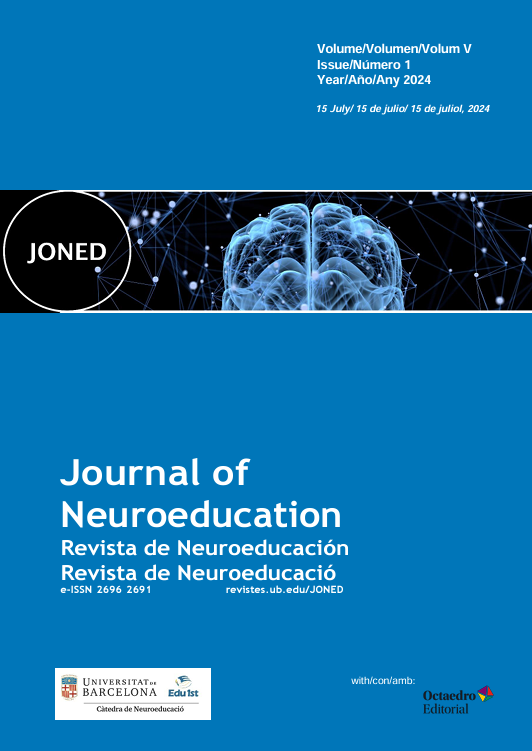Emergence of Confidence with Principles of Curiosity and Information Processing. Philosophy of Mind and Cognitive Neuroeducation Approach
DOI:
https://doi.org/10.1344/joned.v5i1.46734Keywords:
curiosity, confidence, information, education, leaders, trainers, learnersAbstract
Researchers in cognitive neuroscience, developmental cognitive neuroscience, educational psychology, educational technology, education theory, and other related fields collaborate in the emerging field of educational neuroscience, also known as neuroeducation. This interdisciplinary approach aims to explore the connections between psychological processes and education. By integrating basic discoveries in cognitive neuroscience with educational technology, researchers in neuroeducation strive to enhance curricula to foster curiosity and boost confidence levels in learners. The ultimate objective of neuroeducation is to generate both theoretical insights and practical applications that offer a fresh perspective on learning across various disciplines. The development of confidence is closely related to the principles of curiosity and information processing. When people are interested in a topic, they are more likely to seek out information and engage in learning experiences that can lead to deeper understanding. This information process allows people to analyze and understand the information they encounter, which in turn can increase their confidence in their knowledge and abilities. By embracing curiosity and honing their information-processing skills, people can develop a strong self-confidence that empowers them to take new challenges and pursue their goals with determination. This review study on curiosity have uncovered a fascinating insight into its mechanisms. Researchers found that curiosity aligns with a confidence function resembling an inverted U-shape, peaking when individuals have moderate confidence in their knowledge. Moreover, heightened curiosity drives individuals to actively seek out new information, showcasing the profound impact of curiosity on knowledge acquisition. This revelation holds immense promise for understanding human behavior and learning processes. This study focuses on boosting confidence in individuals through the application of curiosity and information knowledge processing techniques to elevate the standards of education and training across both traditional and modern methodologies. The integration of these principles is poised to revolutionize the learning experience, fostering a more dynamic and effective approach to knowledge acquisition and skill development. This innovative strategy holds immense potential to empower learners, educators, and trainers alike, paving the way for a more enriched and impactful educational landscape.
Downloads
Downloads
Published
Issue
Section
License
Copyright (c) 2024 vikas pathak, Kundan Lal Verma

This work is licensed under a Creative Commons Attribution-NonCommercial 4.0 International License.
The authors who publish in this journal agree to the following terms:
a. Authors retain copyright and grant the journal the right of first publication
b. Texts will be published under a Creative Commons Attribution Non Commercial License that allows others to share the work, provided they include an acknowledgement of the work’s authorship, its initial publication in this journal and the terms of the license, and not for commercial use.



